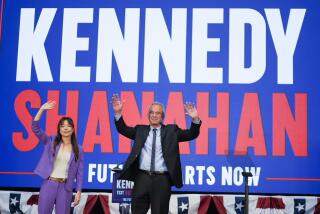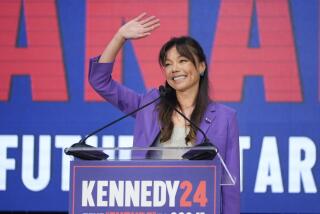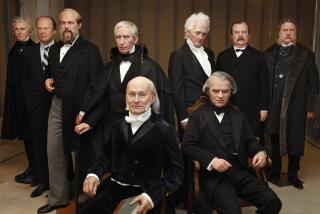Op-Ed: JFK wasn’t the greatest president, but he was a hell of a politician
A few years ago, on an anniversary of the assassination of President John F. Kennedy, the historian Alan Brinkley wrote about a visit to the museum at the Texas School Book Depository, the building in Dallas where Lee Harvey Oswald waited with a rifle to shoot the president on Nov. 22,1963. Brinkley was struck by the extraordinary notes left in the museum’s guest log.
“Our greatest President.” Oh, how we miss him!” “The greatest man since Jesus Christ.”
Those words, I’m sure, were written by Americans who were alive during the Kennedy presidency. Such adoration is usually generational, dependent on the men and women who “knew” him.
Public memory thins with time. I see that because I teach. My students, born long after Kennedy lived and died, know what he was, not so much what he did. To them, he is a cultural figure rather than the political man he was. They did not live through the density of events I remember: the Cold War, the struggle for black civil rights. Ordinarily, when JFK’s name comes up, they speak of the Peace Corps, the space race and the grace and beauty of the man preserved on film. The rest has to be taught or shared by their elders.
He was not qualified for the big job, but then no one ever is. The presidency is an act of faith.
Jack Kennedy was not our greatest president, though he was a good one. He was of the generation that fought in World War II and came home to change America and Americans, the way we looked and the way we thought. Kennedy’s first political slogan, when he ran for Congress from Massachusetts in 1946, was “The New Generation Offers a Leader.”
He was 29 years old then and looked younger, a skinny guy plagued by a lifetime of sickness and the rigors of combat. Most important, he would not wait his turn. Soon enough none of us would and the country was remade.
“There is no status quo,” he once said. True enough then, as America jetted into the future to become a smarter and more ambitious nation: more mobile, intermarried, comfortable with new technologies, new ideas. We were richer than we’d ever imagined we could be. Hopeful, optimistic. And Kennedy, the youngest man ever elected president, was the model of the new American.
He even figured out a new way to become president, revealing that the principal qualification for the office was wanting it. “Why not me?” he said as he began organizing his fellow veterans, concentrating on almost forgotten primary elections and using the newest thing, television, to connect.
He was not qualified for the big job, but then no one ever is. The presidency is an act of faith. It requires judgment above all, in reacting to events unforeseen, bringing out the best in the American people.
As president, Kennedy stumbled at the beginning, dealing with a Southern-dominated Congress of his own Democratic Party and with an entrenched federal bureaucracy. The bloody disaster of the 1961 Cuba invasion, the Bay of Pigs, was of his own making, his naivete. But the nation rallied around him and his approval ratings actually went up. “It’s amazing,” he said. “The worse you do, the more they like you.”
And we did like him. Running against then-Vice President Richard Nixon, he won just 49.7% of the popular vote. A year later, national polls reported that 59% of respondents said they had voted for him. His approval ratings soared to 83%. And after his murder, his martyrdom, 65% would tell pollsters he had been their choice in 1960.
Kennedy’s was a foreign policy presidency. He proposed domestic initiatives such as national healthcare and was pretty much ignored by half of congressional Democrats. But over time, trusting his own judgment, against the advice of older men, he was able to take real control in the nuclear-shadowed struggle with the Soviet Union.
He was, after all, the first president to come to power since 1812 in a world where a foreign power had the capacity — in this case, nuclear intercontinental ballistic missiles — to decisively strike the American mainland. Yet because of Kennedy’s political skill, his efforts to check nuclear proliferation and to reach out to the Soviets, there was less danger of war and annihilation in 1963 than in 1961.
At home, he bent the arc of American history when he had to choose between his Southern party mates and young blacks (Negroes then) demonstrating at lunch counters, knocking at the gates of public colleges and riding buses into the dark dangers of Alabama and Mississippi. He opted for the minority — “This is not a political issue. …This is a moral issue” — no small thing in a democracy.
He was not the greatest president but he was a hell of a politician — candid if not honest, a man who saw greatness and sometimes even touched it. Yet he was unfinished, and he remains forever young — even though he would have been 100 today.
Richard Reeves, a senior lecturer at the USC Annenberg School for Communication and Journalism, is the author of many books including “President Kennedy: Profile in Power.”
Follow the Opinion section on Twitter @latimesopinionand Facebook
ALSO
JFK was America’s most glamorous president. Roz Wyman helped make him a superstar
Thoughts from Dr. Joe: JFK inspired generation to be physically fit
More to Read
A cure for the common opinion
Get thought-provoking perspectives with our weekly newsletter.
You may occasionally receive promotional content from the Los Angeles Times.






